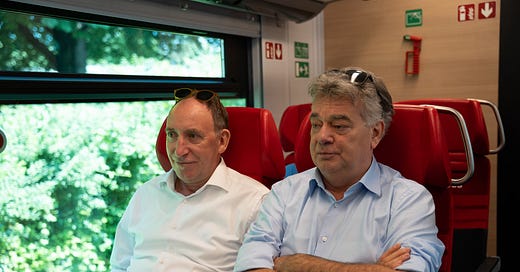Meet The Parties: Greens
Austria's Greens answer questions on the economy, healthcare, foreign policy, and whether they would go into coalition with the far-right Freedom Party
With this edition, ahead of the election on September 29, you are receiving the second in a series of Q&As with Austria’s leading political parties called “Meet The Parties.” The aim of the series is to help voters make more informed decisions and all readers gain a better understanding of where the parties stand on the economy, healthcare, and foreign policy. The series continues with the Greens led by vice chancellor Werner Kogler.
What do the Greens stand for? What are your party’s three primary values?
We Greens stand for climate protection, social justice and a resilient, vibrant democracy.
When you look back on the past five years—on the multiple crises of government, the compromises you’ve made, your low polling numbers—do you still believe that you made the right decision in going into government with the People’s Party?
Yes. The past few years have been marked by crises and a war in Europe, and in that context we have taken responsibility for making life better for people in Austria. We can look back on major successes like the Klimaticket1 and the ‘eco-social’ tax reform package, which rewards climate-friendly behavior via the Klimabonus2 that goes directly into people’s wallets. The plastic bottles deposit scheme, billions for rail expansion, and a boom in renewable energies also count as major successes, as does the end of official secrecy. Another milestone is the automatic adjustment of benefits in line with inflation. There have also been many improvements in the health and care sectors, not to mention the justice system: the strengthening of victims' rights and the tightening of criminal law against corruption.
Governing is not about taking the easy way out. What counts are the results. And we Greens have delivered in key areas.
Would you go into coalition with the Freedom Party?
Clearly and unequivocally: No!
Austria is in a state of economic malaise. What measures would you take to kickstart the economy?
During the pandemic, the government provided extensive aid, saving companies and jobs. This had a positive effect. The Austrian economy grew very strongly in 2021 and 2022. However, the war showed how dependent the Austrian economy still is on fossil fuels. As Russia used its energy as leverage, gas prices rose sharply. The government built up Austria’s strategic gas reserve and provided important energy subsidies for businesses, but we have to reduce our dependence on Russian gas. We are currently providing industry with almost three billion euros to switch to climate-neutral modes of production. This will make the Austrian economy more robust and less vulnerable on external factors in the long term.
How would you resolve the problems in the healthcare system including personnel shortages and longer wait times?
As a matter of principle, we believe that healthcare in Austria should be further expanded and made more financially secure. It is an essential task of politics to ensure comprehensive healthcare for all, regardless of income and place of residence. With our healthcare reform package, we have invested a lot of money and implemented long overdue and necessary reforms. Many measures have been taken to improve the supply of general practitioners and specialists in urban and rural areas and make jobs in the public sector more attractive. Further reforms are of course necessary to consolidate the steps already taken.
With Russia’s war against Ukraine in mind, does Austria need a new security doctrine? Should it surrender its neutrality and join NATO?
Neutrality is anchored in the constitution, and we don't want to change that. What we want is a more active policy of neutrality. We live in one of the safest countries in the world, but to ensure that our future and that of our children continues to be secure, we must do more and not sit back. Through economic sanctions, peace negotiations, and cooperation towards sustainable development, we can resolve or help prevent conflicts in the world. The most important thing right now is to deepen cooperation with our EU partners and further strengthen human rights.
Should Austria’s ban on dual citizenship be repealed?
Yes. Austria still has one of the strictest citizenship regimes in the world; in our view, this approach is completely outdated. Almost every fifth person of voting age living in Austria is now ineligible to vote. We Greens have a clear position on dual citizenship: we want it to make it possible. In our globalized world, the requirement to renounce one's previous citizenship is no longer in keeping with the times and does not reflect the realities of people's lives.
Thank you for subscribing to the Vienna Briefing. Every recommendation helps, so if you know someone who might be interested in reading this newsletter, consider sharing it with them today.
The Vienna Briefing is a reader-supported publication made possible by your donations. If you would like to contribute to my work, think about sending me a tip.
An annual pass valid on all public transportation in Austria that costs €1,095
An annual bonus of between €145 and €290 per Austrian resident designed to offset the impact of the government’s CO2 tax




